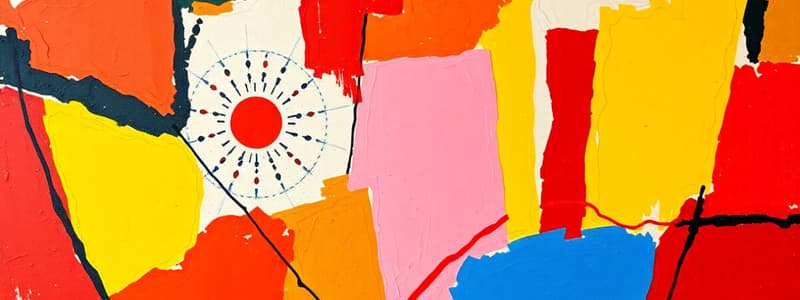Podcast
Questions and Answers
What is the primary focus of anthropologists?
What is the primary focus of anthropologists?
- Analyzing material remains of past cultures
- Researching the impact of climate on geography
- Studying human cultures from a historical perspective (correct)
- Replicating historical ships
Which type of source provides direct or firsthand evidence about an event?
Which type of source provides direct or firsthand evidence about an event?
- Contextual Sources
- Primary Sources (correct)
- Secondary Sources
- Oral History
What significant action did Queen Isabella II's replacement, Gov Gen. Carlos Maria de la Torre, take during his term?
What significant action did Queen Isabella II's replacement, Gov Gen. Carlos Maria de la Torre, take during his term?
- Approved the printing of multiple historical texts
- Abolished flogging as a punishment (correct)
- Documented the Cavite mutiny
- Established the first marine chronometer
In what year and location did the first mass take place according to historical records?
In what year and location did the first mass take place according to historical records?
Who is known for the comprehensive version of Pigafetta's account?
Who is known for the comprehensive version of Pigafetta's account?
What was the title of the article written by Tavera that discussed the Butuan tradition?
What was the title of the article written by Tavera that discussed the Butuan tradition?
Which historian documented the Cavite mutiny?
Which historian documented the Cavite mutiny?
Which of the following codices is known for being formerly named Mazaua?
Which of the following codices is known for being formerly named Mazaua?
Flashcards are hidden until you start studying
Study Notes
History Defined
- Written History: History documented and preserved in written form.
- Oral History: History transmitted through spoken word, such as stories and songs.
Disciplines of History
- Anthropologist: Studies human cultures, both past and present.
- Archeologist: Analyzes material remains of past cultures to understand them.
- Geographers: Study the Earth and human interactions with it.
Sources in Historical Research
- Primary Sources: Direct evidence of a historical event, object, person, or work of art.
- Secondary Sources: Accounts that interpret primary sources to reconstruct the past.
Key Historical Figures and Events
- Fr. Francisco Colin: Author of "Labor Evangelica," a primary source for Philippine history.
- Miguel Bernad: Author of "Kinaadman," a detailed study of Philippine cultures.
- Antonio Pigafetta: Italian chronicler who documented Ferdinand Magellan's voyage.
- 1525: The Queen of France requested that Pigafetta's account of Magellan's voyage be printed.
- Victoria: The only ship from Magellan's voyage that survived and returned to Spain.
- Arlo Amoretti: Compiled a comprehensive version of Pigafetta's account.
- "El Comercio": Article by Dr. Trinidad Pardo de Tavera, discussing the claim of Butuan tradition being inaccurate.
- "Ambrosiana Codex" (formerly known as "Mazaua" and now "Limasawa"): Codex by Robertson documenting the first mass in the Philippines.
- "Nancy Codex": Codex by Skelton, containing information about "Mazzaua", later determined to be Limasawa.
- "Mazaua/Mazzaua": The former name for Limasawa, the island where the first mass in the Philippines is believed to have been held.
- 18th Century: There was no development of the marine chronometer, a crucial navigational tool.
- Elcano: Except for Elcano, all other crew members who sailed with Magellan gave coordinates of their travels in their accounts.
- 20 Crew Members: This was the number of crew members who accompanied Ignacio Fernandez Vial, one of the few survivors of the Magellan expedition.
- Limasawa 1521: The exact year and location of the first mass in the Philippines, now officially recognized.
- Governor General Carlos Maria de la Torre: Replaced Queen Isabella II after her removal from power.
- Flogging: A punishment abolished by Governor General Carlos Maria de la Torre during his term.
- Jose Montero y Vidal: A prolific Spanish historian who documented the Cavite Mutiny.
- Dr. Trinidad Hermenigildo Pardo de Tavera: A Filipino scholar and researcher who provided a Filipino version of historical accounts.
- Governor General Rafael Izquierdo: Replaced Governor General Carlos Maria de la Torre.
- February 17, 1872: The date of the execution of Gomburza (Mariano Gomez, Jacinto Zamora, and Jose Burgos).
Studying That Suits You
Use AI to generate personalized quizzes and flashcards to suit your learning preferences.




